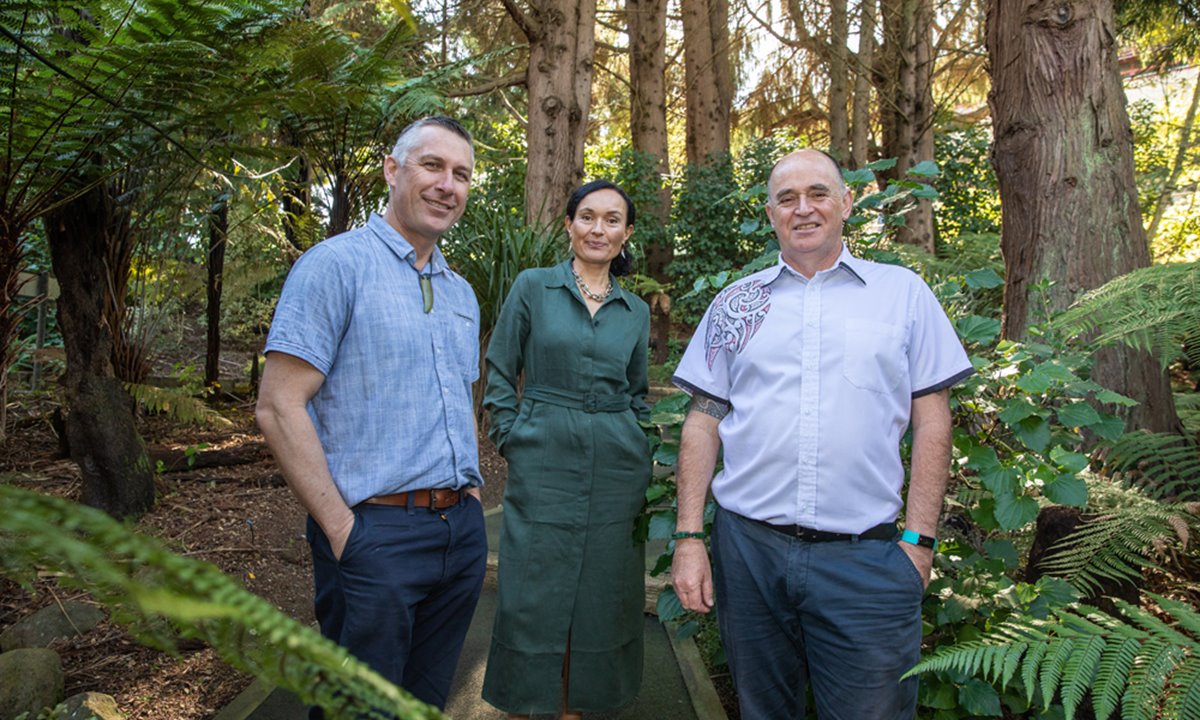A team of University of Waikato researchers have successfully secured $6m funding over four years in the latest Ministry of Business, Innovation and Employment (MBIE) Endeavour Fund round.
Associate Professor Māui Hudson, Professor Tahu Kukutai and Associate Professor Te Taka Keegan are leading Tikanga in Technology: Indigenous approaches to transforming data ecosystems - a programme that aims to test Māori approaches to collective privacy, benefit and governance in a digital environment with a view to increase the benefits to Māori and reduce data harms.
The work will focus on how tikanga Māori (customary protocols) and Mātauranga Māori (Indigenous knowledge) inform the construction of digital identities and create a better understanding of relational responsibilities to data. The team of researchers will explore tools and processes that can help IT workers understand and incorporate Indigenous perspectives when working on data sets, not only in terms of storage and data processing but also in the creation of algorithms that have the potential for bias.
With research spanning a broad range of population topics from iwi demography and census methods to the impacts of colonisation on Indigenous health, Professor Tahu Kukutai (Ngāti Tiipa, Ngāti Kinohaku, Te Aupōuri) brings a wealth of knowledge and experience to Tikanga in Technology. Professor Kukutai co-edited the landmark book Indigenous data sovereignty: Toward an agenda, which is widely regarded as the seminal text on Indigenous data, while her new co-edited bookIndigenous data sovereignty and policy, due for release in October, will offer a rich account of the potential for Indigenous data sovereignty to protect against the threats of data-related risks and harms. Professor Kukutai says it’s more critical now than ever to address the issue of Māori data sovereignty. “Tikanga in Technologyincludes projects co-designed with Māori communities, which allows us to help build flaxroots data capability and do research that meets their priorities and aspirations,” she says.
Winner of the Prime Minister’s Supreme Award for Excellence in Tertiary Teaching and an authority on Māori language technologies, Associate Professor Te Taka Keegan (Waikato-Maniapoto, Ngāti Porou, Ngāti Whakaaue) is looking forward to bringing his experience and passion to research that will enable Indigenous perspectives to shape Artificial Intelligence for the benefit of Indigenous peoples. Associate Professor Keegan is a modern day tohunga (expert) in teaching, research, and innovation. He has worked with a number of projects including the Māori Niupepa collection, the Microsoft Keyboard, Windows and Office in Māori, Moodle in Māori, Google Translate, the Translator Toolkit, the Macroniser and SwiftKey.
A founding member of Te Mana Raraunga Māori Data Sovereignty Network and the Global Indigenous Data Alliance alongside Professor Kukutai, Associate Professor Māui Hudson (Whakatohea, Ngā Ruahine, Te Māhurehure) says recent innovations in digital technologies are a double-edged sword for Indigenous peoples. “Rapid advances in data linkage create vast potential for improved wellbeing as well as major risks for group exploitation so we need a profoundly different approach to individual data rights and protection - one that recognises collective identities,” he says. “Our project will look at the tools, processes and mechanisms we can offer the community of developers to enable ethical use and to generate more equitable outcomes for Māori.”
Associate Professor Hudson says it’s important to encourage developers to be more thoughtful about what they create and to support them in optimising data ecosystems that recognise and benefit Indigenous societies. The team’s research will move beyond current efforts to reduce bias in algorithms and explore what it means to ‘decolonise’ algorithms that adversely affect Māori communities. “Ongoing discussions about Māori data sovereignty are occurring beyond central government, but even though the private sector appears to be further behind, I think Indigenous data sovereignty is an area where Aotearoa New Zealand can lead the way,” he says. “We have a global advantage in Indigenous research and, with funding for projects like this, we can continue to optimise this edge to transform data ecosystems so that they are beneficial for Indigenous peoples.”
Situated at the interface of Mātauranga Māori and data science, this interdisciplinary programme has strong support from key data stakeholders across Te Ao Māori and Government. Associate Professor Hudson says the goal for Tikanga in Technology is to impact on data science projects in communities, at the University of Waikato, and beyond. “This funding success is a wonderful result for our team of researchers and for the evolving area of Indigenous data rights,” he says. The research team plans to make publicly available a range of tools, frameworks and principles that will promote ethical and equitable engagement, with data grounded in Te Ao Māori world-views.
The Tikanga in Technology: Indigenous approaches to transforming data ecosystems programme is due to get underway in October 2020.



.jpg?sfvrsn=14164ce5_1&mode=crop&width=770&height=462&format=jpeg&quality=85)
.jpg?sfvrsn=414c0434_1&mode=crop&width=770&height=462&format=jpeg&quality=85)
.png?sfvrsn=16db4cf2_1&mode=crop&width=770&height=462&format=jpeg&quality=85)